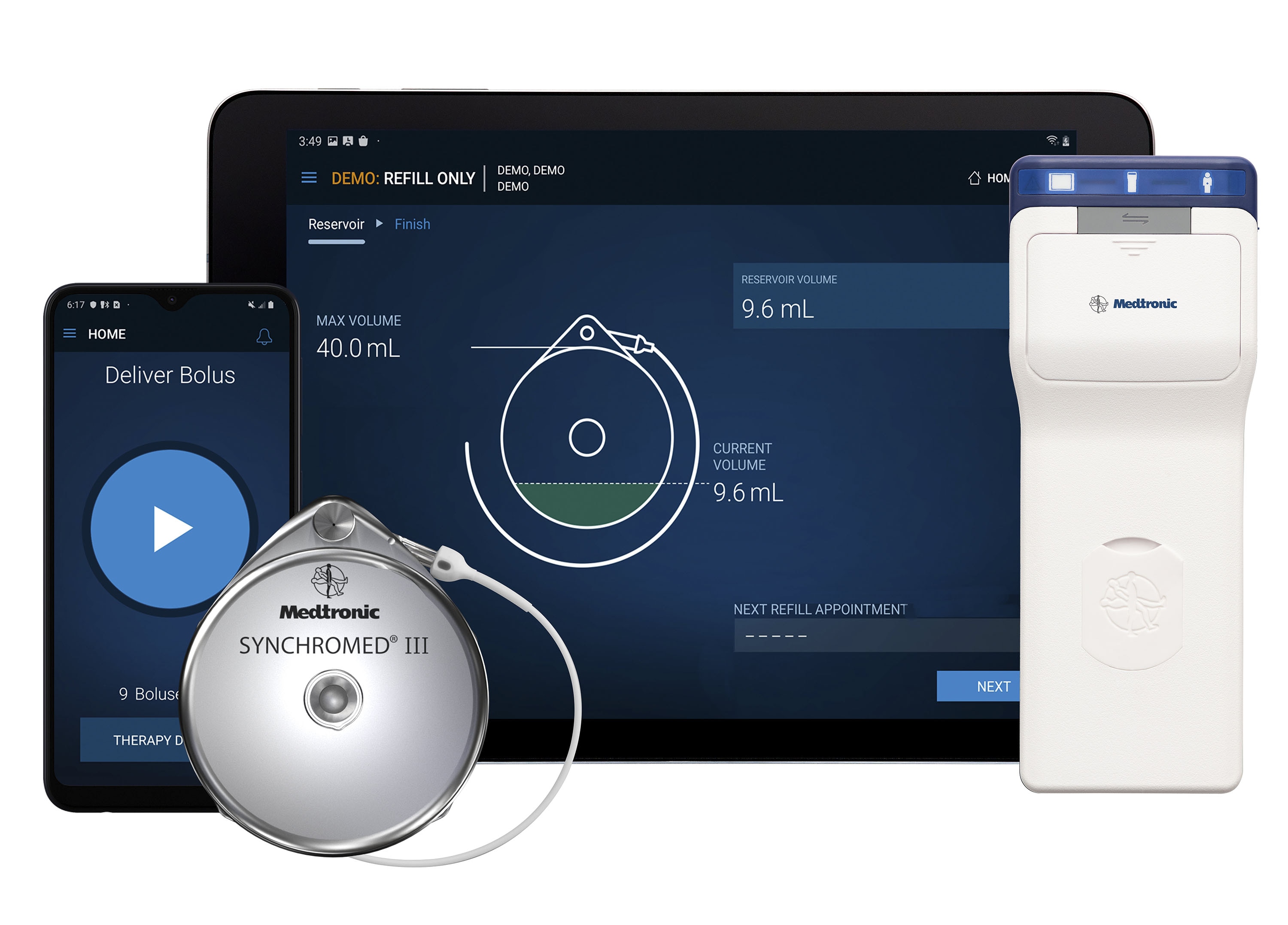Less pain. Fewer side effects.
An alternate route of drug delivery
Targeted drug delivery overview
Intrathecal drug delivery enables patients to experience pain relief using a fraction of an oral medication dose,1–3 which can help to minimize the uncomfortable and sometimes intolerable side effects (e.g., drowsiness, dizziness, nausea, vomiting and constipation) that often accompany pain medication taken orally.2–5
The SynchroMed™ III intrathecal pump and implanted catheter releases prescribed amounts of pain medication directly into the intrathecal space, interrupting pain pathways at the source. Unlike oral medications that must be absorbed systemically and cross the blood-brain barrier to reach pain signals, targeted drug delivery interrupts pain pathways at their source in the cerebrospinal fluid and spinal cord. An implanted, programmable pump and catheter release prescribed amounts of pain medication directly into the intrathecal space.
The SynchroMed™ Clinician Programmer provides a simple, guided workflow approach to programming SynchroMed™ implantable pumps and the myPTM™ Personal Therapy Manager works with the SynchroMed™ pump to help alleviate unpredictable pain by enabling on-demand intrathecal boluses.


Intrathecal drug delivery enables patients to experience pain relief using a fraction of an oral medication dose.1–3
Helping eliminate systemic opioids
The Control Workflow™ for targeted drug delivery (TDD) is an approach to help eliminate systemic opioids and provide effective pain relief. The purpose of this workflow is to provide a treatment option for chronic pain using low-dose TDD. Patients should receive appropriate pain treatment based on careful consideration of benefits and risks of treatment options.
TDD has demonstrated a substantial reduction in the amount of drug required to effectively manage chronic pain. By having an outlined workflow, we are hoping to reduce perceived barriers to the TDD therapy.3
Empower patients to alleviate pain
SynchroMed™ III pump
The SynchroMed™ III is an implantable drug delivery system that helps manage chronic pain, cancer pain, and severe spasticity. Learn more about each of the indications below.
Risks of targeted drug delivery
Surgical complications are possible and include infection, headache, spinal fluid leak, meningitis, and paralysis. Possible complications include the catheter or pump moving within the body or eroding through the skin which may lead to additional surgery. The catheter could leak, tear, kink, or become disconnected. The pump could stop because it has reached end of service or because of failure of another of the part of the infusion system. Any of these situations may cause symptoms to return and may require additional surgery. Device malfunctions may result in clinically significant overdose or underdose. Acute massive overdose may result in coma or fatality. An inflammatory mass can form at the catheter tip and result in serious neurological impairment, including paralysis. The therapy may not meet the patient’s expectations or may lose effect. Electromagnetic interference (EMI) and magnetic resonance imaging (MRI) may cause patient injury, system damage, operational changes to the pump, and changes in flow rate. See SynchroMed™ product labeling for more information.
This therapy is not for everyone. In addition to risks related to a surgical procedure and drug-related adverse events, pump or catheter problems can cause serious or fatal drug overdose or underdose and may require corrective surgery.
- Grider JS, Harned ME, Etscheidt MA. Patient selection and outcomes using a low-dose intrathecal opioid trialing method for chronic nonmalignant pain. Pain Physician. 2011;14:343–351.
- Hamza M, Doleys D, Wells M, et al. Prospective study of 3-year follow-up of low-dose intrathecal opioids in the management of chronic nonmalignant pain. Pain Med. 2012;13:1304–1313.
- Ruan X. Drug-related side effects of long-term intrathecal morphine therapy. Pain Physician. 2007;10:357–366.
- Noble M, Treadwell JR, Tregear SJ, et al. Long-term opioid management for chronic noncancer pain. Cochrane Database Syst Rev. 2010;20(1):CD006605.
- Smith TJ, Staats PS, Deer T, et al. Randomized clinical trial of an implantable drug delivery system compared with comprehensive medical management for refractory cancer pain: impact on pain, drug-related toxicity, and survival. J Clin Oncol. 2002;20:4040–4049.
